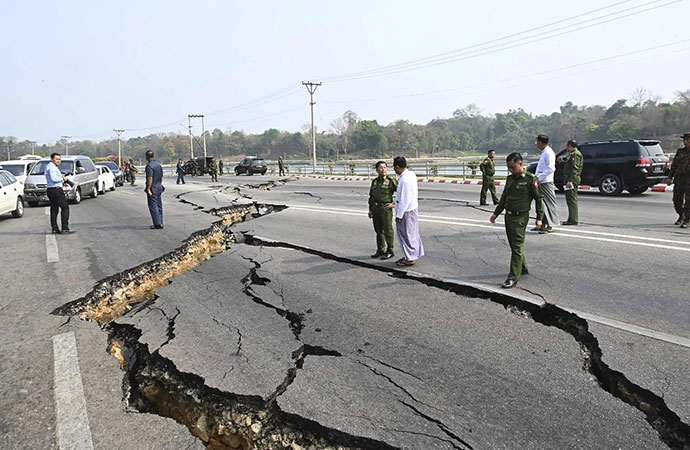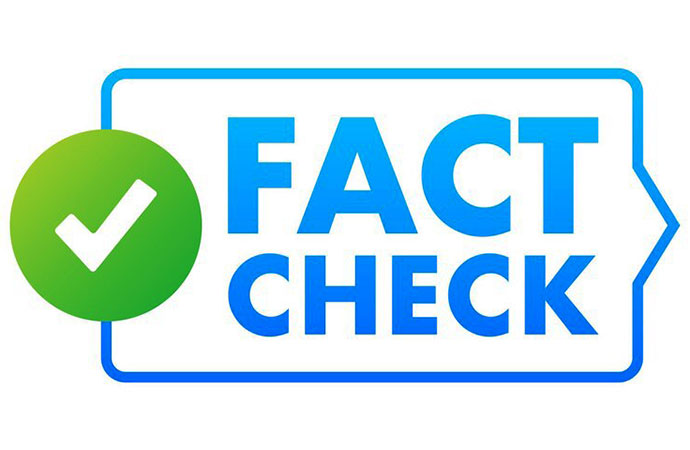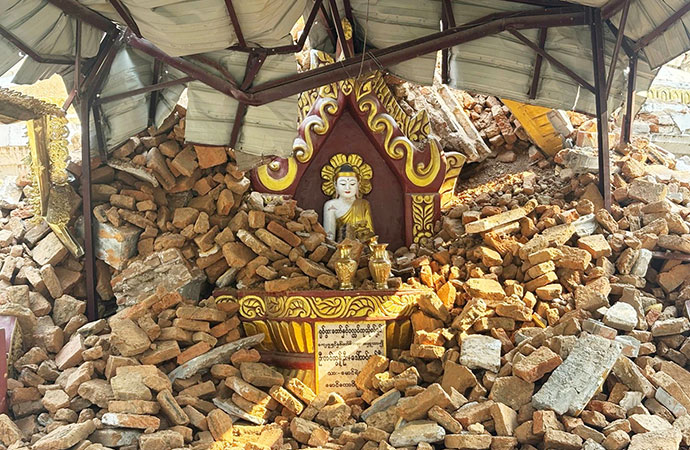World this week

Photo: AP/UNB
Myanmar's ruling military declared a temporary ceasefire in the country's civil war Wednesday (Apr. 2) to facilitate relief efforts following a 7.7 magnitude earthquake that has killed more than 3,000 people. The announcement by military leaders who also head the unelected government came late Wednesday on state television MRTV, which said the halt in fighting would run until April 22 to show compassion for people affected by the quake.
The announcement followed unilateral temporary ceasefires announced by armed resistance groups opposed to military rule. The quake hit midday Friday (Mar. 28), toppling thousands of buildings, collapsing bridges and buckling roads. The death toll rose to 3,003 on Wednesday, with more than 4,500 people injured, MRTV reported. Local reports suggest much higher figures. The earthquake also rocked neighboring Thailand, causing the collapse of a high-rise building under construction in Bangkok. One body was removed from the rubble early Wednesday, raising the death total in Bangkok to 22.
The UN food agency said it is closing all of its bakeries in the Gaza Strip, as supplies dwindle after Israel sealed off the territory from all imports nearly a month ago. Israel, which later resumed its offensive to pressure the Hamas militant group into accepting changes to their ceasefire agreement, said enough food had entered Gaza during the six-week truce to sustain the territory's roughly 2 million Palestinians for a long time.
UN spokesperson Stephane Dujarric said Israel's assertion was "ridiculous," calling the food shortage very critical. The organization is "at the tail end of our supplies" and a lack of flour and cooking oil are forcing the bakeries to close, Dujarric said Tuesday (Apr. 1). Markets largely emptied weeks ago. U.N. agencies say the supplies they built up during the truce are running out. Gaza is heavily reliant on international aid because the war has destroyed almost all of its food production capability.
The Indian government presented a bill in parliament that plans sweeping changes in the management of vast tracts of land set aside solely for Muslim use, potentially stoking tensions between the government and minority Muslims. The land and properties fall under the "waqf" category, which means "to stay" in Arabic, and are endowed by a Muslim for religious, educational or charitable purposes. Such land cannot be transferred or sold. Over 25 waqf boards hold nearly 85,1535 properties and 900,000 acres of land, putting them among the top three landowners in India.
The Waqf (Amendment) Bill, tabled by Prime Minister Narendra Modi's government, proposes inclusion of non-Muslim members in the central Waqf Council and boards and will enable the government to determine ownership of disputed waqf properties. Opposition lawmakers and Islamic groups see the bill as a plan to secure assets owned by Muslims and to weaken their property rights under the Indian constitution.
US President Donald Trump declared a 10% baseline tax on imports from all countries and higher tariff rates on dozens of nations that run trade surpluses with the United States, threatening to upend much of the architecture of the global economy and trigger broader trade wars. Trump held up a chart while speaking at the White House, showing the United States would charge a 34% tax on imports from China, a 20% tax on imports from the European Union, 25% on South Korea, 24% on Japan and 32% on Taiwan.
The president used aggressive rhetoric to describe a global trade system that the United States helped to build after World War II, saying "our country has been looted, pillaged, raped, plundered" by other nations. Trump declared a national economic emergency to launch the tariffs, expected to produce hundreds of billions in annual revenues. He has promised that factory jobs will return back to the United States as a result of the taxes.

























Leave a Comment
Recent Posts
Auspicious beginnings, but a l ...
The newly elected government of Bangladesh is now in office, and the e ...
Caught between tigers and pira ...
Over 10,000 fishermen in the Sundarbans have suspended their fishing a ...
Historic Chawk Bazar comes alive with iftar items on ..
Shaping Young Conservationists: School Conservation ..
Iran has said it has reached an understanding with t ..
New Finance Minister Amir Khosru Mahmud Chowdhury